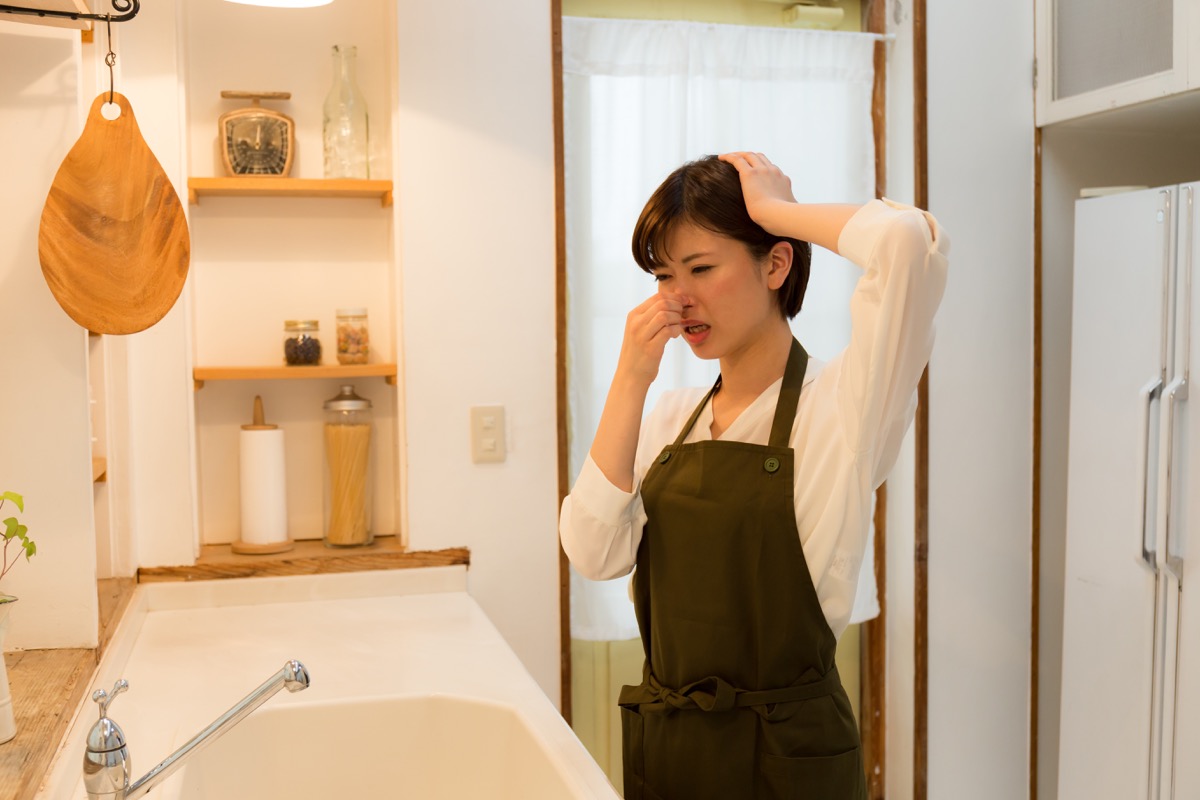If You Smell This in Your Home, Evacuate Immediately, Experts Say

Whether you own your home or rent, you probably have some firmly held ideas about how you like your space to look and feel. However, if you’re not paying attention to how your home smells, you could be putting your health and safety at risk. Read on to discover the odor in your home that could tip you off to a serious problem—and why it’s a sign you should evacuate immediately, according to experts.
RELATED: You Should Never Clean Your Toilet With This, Experts Warn.
1
Rotten eggs

If you notice the scent of rotten eggs wafting throughout your home, but there’s no sign of a carton past its expiration date in your fridge or trash, it’s time to clear out of your house immediately. This scent can be an indication of a natural gas leak that could put you at risk of serious injury or death, says Lee Devlin, managing director at Homecure Plumbers, a London-based gas, water, and heating maintenance and repair company.
“This may result in the onset of serious health symptoms such as sickness, nausea, and suffocation,” Devlin explains. If you notice this scent, leave the house and bring anyone else who lives there, including pets, with you. However, since natural gas can easily ignite, natural gas company Peoples cautions against smoking, turning on electrical switches, opening windows or garage doors, or using a phone inside, as these may provide a potential ignition source or cause the leak to spread.
However, if your gas has been checked and you still smell sulfur, there could be another danger in your home—albeit a less pressing one. “If your drinking water has an unusual taste, sulfur-like smell, and/or cloudy appearance then there is a fair chance that it has been contaminated,” explains Devlin.
This could be the result of decaying material in a well, sulfur bacteria, pollution, or a chemical reaction within your pipes or water tank. “The consumption of such water could cause a variety of health issues, including diarrhea, vomiting, and respiratory difficulties,” says Devlin.
For the latest safety news delivered straight to your inbox, sign up for our daily newsletter.
2
Ammonia

That ammonia smell in your home might be the result of something far more serious than some spilled cleaning products.
“A sewer gas leak will involve the release of decaying waste and exposure to gases such as hydrogen sulfide, ammonia, and methane,” explains Devlin. If you remain in a space with a sewer gas leak, you may symptoms ranging from headaches to asphyxiation, Devlin cautions.
If you notice methane or ammonia smells in your home and have noticed either foundation cracks or plumbing problems at the same time, leave the space immediately and call a plumber.
3
Something sweet

If you notice a sweet, slightly chemical odor in your home, it’s time to call in an expert. While freon, a type of coolant used in air conditioners and refrigerators, is odorless, when it leaks it can create a sweet smell with an odor resembling chloroform, or an oily odor when it mixes with refrigerant oil, according to the experts at One Hour Heating & Air Conditioning.
Devlin notes that even if you don’t smell anything strange, a hissing noise coming from your fridge or AC can tip you off to the problem. “The continuous inhalation of freon is likely to result in nausea, headaches, and other health symptoms. Those with a history of heart issues will be at particular risk,” he explains.
RELATED: Never Eat Leftovers That’ve Been in the Fridge This Long, Experts Warn.
4
Nothing

If you don’t notice any particular odor, but start feeling sudden dizziness, nausea, confusion, shortness of breath, or blurred vision, leave your home immediately, as this may be a sign of a carbon monoxide leak.
Carbon monoxide poisoning can be the result of a malfunctioning appliance, blocked fireplace chimney or flue, a venting failure, or running fuel-burning power tools, vehicles, or generators in your home, says Marla Mock, VP of operations at Aire Serv, a Neighborly company. Carbon monoxide poisoning can quickly result in unconsciousness and death, so it’s important to leave your home immediately if you notice any of these symptoms.
“A carbon monoxide detector is truly the only way to know carbon monoxide is in the home. It is impossible to identify carbon monoxide without the help of a device,” says Mock.
RELATED: If You’re Doing This in the Shower, Doctors Say to Stop Immediately.